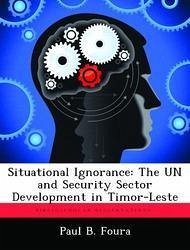The United Nations (UN) intervention in Timor-Leste in 1999-2005 has been critically acclaimed as a "model" peacekeeping operation. By temporarily assuming sovereign powers on behalf of Timor-Leste, the UN Transitional Authority in East Timor (UNTAET) was arguably the UN's most significant foray beyond traditional peacekeeping into the more comprehensive arena of state-building. Development of a competent and non-partisan security sector was one of UNTAET's greatest challenges in making Timor-Leste a viable, independent state. UNTAET's ambitious mandate ended with Timor-Leste becoming an independent sovereign nation in May 2002, with successor missions taking an advisory role in support of the new Timorese government. The spectacular failure of Timor-Leste's security sector in April-May 2006 suggests that UN efforts to prepare the Timorese police and military were inadequate. This monograph examines relevant books, articles and UN reports, and concludes that the UN was deficient in preparing Timor-Leste's security sector for the departure of UN peacekeeping troops, police and civilian advisors. In particular, it contends that the UN was passive in defense force creation and development; that it failed to adequately develop Timor-Leste's police service as an institution; and that it failed to ensure adequate civilian control mechanisms over the police and military. The underlying theme shared by each of these three shortcomings is that the UN failed to understand the Timorese narrative, and through this lack of understanding by act or omission pursued policies that provided Timor-Leste with a dysfunctional security sector.
Hinweis: Dieser Artikel kann nur an eine deutsche Lieferadresse ausgeliefert werden.
Hinweis: Dieser Artikel kann nur an eine deutsche Lieferadresse ausgeliefert werden.








